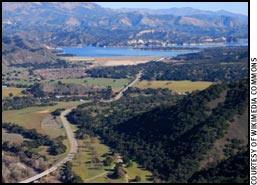Why Do They Value the Land?
California landowners share views on forest and range resources.
 Private owners of California's forests and rangelands value their land mostly for its natural amenities and as a financial investment, according to a study published in the October–December 2011 issue of the University of California's California Agriculture journal. About 42% of forest and rangeland is in private ownership.
Private owners of California's forests and rangelands value their land mostly for its natural amenities and as a financial investment, according to a study published in the October–December 2011 issue of the University of California's California Agriculture journal. About 42% of forest and rangeland is in private ownership.
"A variety of reasons were reported for owning land," reports lead author Shasta Ferranto, a doctoral candidate in UC Berkeley Department of Environmental Science, Policy and Management.
"To 'live near natural beauty' was the objective ranked by most landowners as important. Other popular reasons included 'appreciation in land value,' 'escape from city crime and pollution,' 'financial investment' and 'live in a small community.'" The research article, and the entire October-December 2011 issue, can be viewed and downloaded at http://californiaagriculture.ucanr.org.
Thirty-four million acres of California's forests and rangelands are privately owned. These lands represent 34% of the total land in the state and provide important ecosystem services such as pollination, wildlife habitat and carbon sequestration (removal of carbon from the atmosphere and storage in carbon sinks such as forests). However, little was known about the people who own and manage the land until this recent survey by UC Cooperative Extension and UC Berkeley scientists. Their findings:
- Many of the more than 600 forest and rangeland owners in 10 counties who completed the 17-page survey reported they had been approached to sell their land for development.
- Owners of large properties (500 or more acres) were more likely to carry out or be interested in environmental improvements than owners of small properties.
- Only about one-third of landowners had participated in conservation programs; few had conservation easements.
- The majority of the landowners were primary residents.
- Only one-third reported earning income from their land.
- Asked about what reasons would influence a hypothetical future decision to sell their land, almost 20% reported they would never sell their land. Of the remaining 80%, just more than half chose "it is too much work to maintain," followed by "can't afford to keep it" and other financial concerns.
[Click here to go to the top of the page.]












